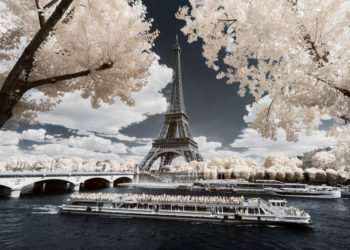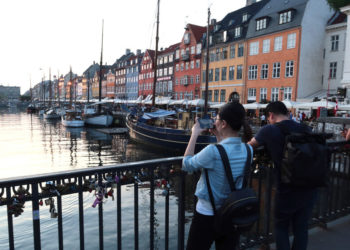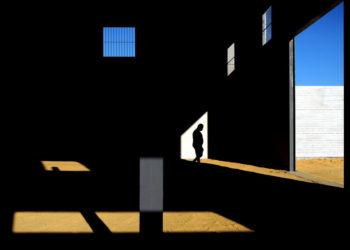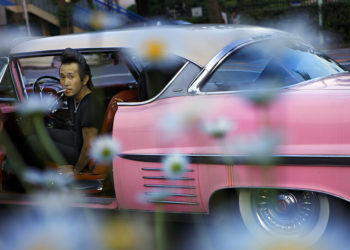One way or another we are all suffering the consequences of the COVID-19 crisis. Of course the photography industry, but also, and in a very special way, photographers, who in many cases are workers freelance in a profession that hardly allows teleworking. We have spoken with some of them and we tell you how the difficult situation we are experiencing is affecting them.
Most of those who have answered us have confirmed what we already expected, because it is being the keynote throughout Spain: Stop and cancellations of all kinds of projects and in all areas. It is the case for example of Raven Cuckoo, a photographer specialized in editorial, portrait and fashion whom we interviewed a couple of years ago.
 From Cuco Cuervo’s ‘Xtumirada’ project.
From Cuco Cuervo’s ‘Xtumirada’ project. “Right now I have stopped everything we had planned in the coming weeks —He tells us— I am at home as recommended by all the authorities and of course, that implies closing the studio until this happens. I had many confirmed projects that, for both me and the clients, we have thought that the best thing is to delay the sessions until everything returns to normal …”

Similar opinion is Castro Stele, the photographer specialized in portraits that was recently in the news when she was chosen to update the official portraits of the Royal House. She tells us how “everything has stopped, all the works, workshops, exhibitions or new projects have disappeared for now. “
More or less the same as Pablo Gil, photographer specialized in advertising and gastronomy, who has seen as “virtually all jobs have been canceled. The face-to-face obviously all are canceled but the ones that I could continue doing from home many have stopped and I only keep two projects open that are progressing by the dropper.“
 From the series ‘Zoocosis’ by Estela de Castro
From the series ‘Zoocosis’ by Estela de Castro Pablo has even had to stop the inauguration of a new study, 45 strokes, that I had planned for March 20, “and we have postponed no date until the situation is resolved and it is safe to hold such an event.”
The world of photojournalism
A scope especially affected The coronavirus crisis is that of photojournalism, doubly affected by the precariousness of the profession and the fact of having to carry out their work (if they have it) in the “front line”, obvious risk of catching and having to move around on a stage where people are asked not to leave home.
 From Juan Teixeira’s ‘Turkistan’ project
From Juan Teixeira’s ‘Turkistan’ project For this reason, there have already been initiatives such as the Professional Association of Asturian Photojournalists, with a statement asking for “defend the right to exercise photojournalism in decent conditions. For that to be so —Reads the statement— we need security guarantees from the media for which we work that are also backed by public administrations” The measures that ask there are basically three:
Basic protective equipment (mask, gel and gloves).
The assurance that the means that contract the services of eventual collaborators without a stable contractual relationship will respond to the possible physical and economic consequences arising from a possible contagion and their consequent incapacity for work during the course of work.
Letters and accreditations expressly to facilitate both our work and that of the state security forces and bodies, which should not waste time and energy around photojournalists.
A laudable idea but that, for the moment, seems to be a utopia. So at the moment what press photographers are doing is basically protect yourself. This is corroborated Juan Teixeira, a Galician photojournalist from whom we taught you a long time ago his project on Turkish Kurdistan.

“The truth is that the photojournalism situation was already extremely precarious, so I don’t know if this could affect us even more”
“I am working in Vigo sending some photos to the agency and on our own website”He tells us. “The measures are logical in this case: minimum contact, mask, hand washing, distance … The truth is that the situation of photojournalism and documentary photography was already extremely precarious, so I do not know if this could affect us even more.”
Juan also tells us something that seems common to many photographers: the travel cancellation: “I have canceled two that I had planned to carry out a project, one of them in Tindouf. Obviously, with all this, you should not travel to areas where the coronavirus has not arrived and they have very basic health, as in this case, so I have postponed the trip.. ”
 Photo by Mario Suárez Porras
Photo by Mario Suárez Porras The same has happened to Mario Suarez Porras (photographer specialized in nature whose work we showed you a little over a year ago), who has had to cancel the trip he had scheduled for Easter to photograph natural areas of Orense.
“In summer —He tells us— I have one to Iceland that I will not cancel yet, I cross my fingers …” Mario also points us to another burning question: How many photographers have not been particularly affected in this regard since, unfortunately, they can’t live on photography and they are maintained thanks to other works.
If sport stops …
In that same case (not being able to live on photography) is Happy sanchez, award-winning athletic sports photographer as we told you recently: “I don’t live exclusively from it, that’s why I can keep photographing while I have my other job“
 Photography by Félix Sánchez
Photography by Félix Sánchez Either way, Felix tells us that “all events are canceled […]
I have lost several sporting events for this month and next” That in athletics, but the same is true of other sports, including the “king sport.”
“We will have to save as much as possible and use savings to continue paying the bills”
He works mainly in it Rafa Aparicio, sports photographer that we included in our recommendations a long time ago. Like many people, Rafa is standing without being able to work: “All sports and company events have been canceled, awards and presentations“
This photographer tells us how “As the news came out, I have been in contact with the companies I collaborate with and we have been understanding that there was no point in the event taking place. The League for which I also collaborated directly stopped it, so there was no other option, and the media for which I collaborate, having lowered the work so much, are being done by people on staff or with a landline. So —Concludes— collaborators to the piece also we are left with nothing to do“
 Photograph of LaLiga of professional soccer by Rafa Aparicio.
Photograph of LaLiga of professional soccer by Rafa Aparicio. “I hope it doesn’t get too long —Continues Rafa— I understand that at least until mid-April, at least until after Easter, we will continue to have to be at home for the safety of all. You will have to save as much as possible and throw away savings in order to continue paying the bills and, of course, defer completely for at least a year any purchase of material that you plan to buy”
Photographers and festivals
Another of the legs that will inevitably affect photographers is the cancellation or delay of the different related events that were going to be held during the year. At the international level, the cancellation of Photokina 2020 has just been announced, and for what concerns Spain, the Barcelona Photo Forum Fest 2020 has been delayed (without a new date yet), and the Photogenic Festival 2020 announced the change of its “strong day” , called All Day Photogenic, for the first of June.

“If everything goes well, after summer we will have a saturation of accumulated events”
On those same dates I would have to start PhotoEspaña, the largest event in this field that, for the moment, has not communicated anything yet (although it should not take long to hear from you). Be that as it may, to know a little more about this topic we have spoken with Look Pastor, an interesting case because it meets the double condition of photographer and police station / organizer involved in various events.
“I am currently working on five festivals distributed from May to November and it gives me a bit of vertigo to see that they will be concentrated in practically two months. If everything goes well, after summer we will have a saturation of accumulated events, which will inevitably overlap in dates, with the consequences that will entail”
Look, known above all for her Bidean project, she tells us how keep working in a more or less normal way: “Luckily, both my personal work and the management and communication of festivals allow me to work wherever the network reaches and I can plug in my laptop. With what I am teleworking from home, although with the gravity of the situation it is difficult for me to concentrate, it helps me to keep my mind occupied“
 From the ‘Bidean’ series by Miren Pastor.
From the ‘Bidean’ series by Miren Pastor. Questioned about the cancellation of projects, the artist tells us that “luckily in all the cultural projects in which I am involved we work online, they are flexible and given the circumstances they can be delayed towards the end of the year. And in the case of classes, the ability of schools to adapt to the tools offered by online platforms to be able to continue normally is wonderful.”

The immediate future
Without a doubt, of course, nobody knows what’s going to happen in the coming weeks, that’s why photographers generally questioned they are resigned: “This is going to be a year of adjustments —He tells us Rafa Aparicio– I am very envious of the measures being taken in countries as close as France and Belgium, it seems that in Spain photographers are not valued at all as is the case with the self-employed and in this case both converge.”
 Photo by Pablo Gil
Photo by Pablo Gil For his part, Look Pastor adds that “Fortunately or unfortunately, my generation has not known years of stability and comfort in the cultural sector and we have learned to live day by day accompanied by uncertainty. I am still not very aware of the magnitude of the economic consequences that we face, but each month we have to pay rents, the quota of self-employed people, bills … and of course, with the passing of days, the situation will worsen”
“I hope that we can meet again soon around festivals, concerts, exhibitions and other cultural activities”
In the same line, Castro Stele he tells us how he has been through “Very precarious times in the profession, so I do not see my future as a photographer in jeopardy because of this, I do not intend to give up. I will get ahead as I have always done, I am able to live and do many things with little money, I will adapt to whatever comes. “
To which Pablo Gil adds: “we do not really know the depth or the damage that this situation is going to cause in our sector or in that of our current or potential clients. Taking a correct reading of this situation on our part will be essential to be able to survive the virus in business. Obviously the market is going to contract and we will see more budgetary tensions, more competition and ultimately fewer orders, it will be time to reinvent ourselves and give a clear and firm message to customers, we must continue fighting for quality and not for precariousness. “
 Photokina 2020 will never take place
Photokina 2020 will never take place Yes, they all coincide in expecting that “the measures that are being taken begin to be effective as soon as possible to reduce the economic consequences as soon as possible and to retake with enthusiasm, energy and great enthusiasm the revival of the cultural sector“, As Miren tells.
She also hopes that “We can meet again soon around festivals, concerts, exhibitions and other cultural activities, even being able to value them more, since many times we belittle what we have within our reach until we stop having it”
And, of course, everyone also harbor some optimism. How Raven Cuckoo which concludes “convinced that everything will return to normal and we can resume our profession very soon” Hopefully so.
Cover photo | Ezra Jeffrey-Comeau








Discussion about this post